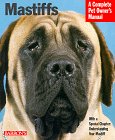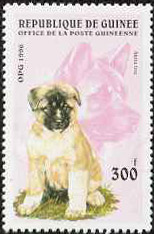
Mastiffs: Everything About Purchase, Care, Nutrition, Grooming, Behaviour and Training (A Complete Pet Owner's Manual)
Mastiffs are very large, powerful looking dogs which were developed to guard livestock. They are generally calm, though individuals vary. Like all large dogs, they need to be carefully socialized with people and other dogs, and trained in acceptable behaviour while they are small, and it is easier to get them to do what you want.
Well-socialized and well-trained Mastiffs can be excellent companions for children, though they need supervision, since they are very large dogs which can easily knock small children over. Many children have fond memories of playing with mastiffs, and generally these dogs are patient, with nice natures. It is important, however, to check out parents of possible pups, to see if they are friendly with stable temperaments. Mastiffs can vary in terms of how pushy and headstrong they are, and how friendly they are with strangers. A family Mastiff needs to be especially calm and friendly. It's worth asking breeders about the characteristics of their lines, and looking at pups from different litters, as well as comparing pups from the same litter, so you have the best chance of finding a pup that is likely to suit you.
Mastiffs need a firm, but gentle hand in training, and should be taught basic obedience skills, such as sitting, staying, and walking nicely on the lead, from when they are pups. They don't respond well to shouting, and are too big to be pushed around. They like to please their owners, though they don't always obey. Consistency pays off, as well as never rewarding bad behaviour, and only giving rewards, like opening the door for a walk, when the pup is calm rather than pushing to go out. It is unwise to teach Mastiffs to be wary of people. They aren't especially barky, but they are natural guard dogs, and do not need to be taught to look imposing and frighten intruders. You want them to be gentle so that visitors are safe, while their sheer size and seriousness will deter unwanted guests. Even the friendliest Mastiffs don't usually allow visitors into the home unless their owners give permission to the visitor to enter. Well-trained Mastiffs won't bite intruders, but rather detain them until someone arrives.
Mastiffs should be socialized with other dogs when they are pups, and socialization should be ongoing. Adults may still become dog-aggressive, but, with enough obedience training, they should be able to ignore other dogs that don't come very close. They should be walked on a lead in public places, especially near children and other dogs, and obedience training is important, since a Mastiff that decides to take off can easily pull over the handler.
These dogs cost a lot in food, and are often given up because owners find they simply take up too much space, and eat a lot. Look at the parents of any pup you are interested in, and think ahead. Do you have enough space for such a big dog? They can also drool, some more than others, which can also put some people off, but they tend not to need a lot of grooming.
Common health problems in Mastiffs include breathing difficulties, which can lead them to snore, heart disease, hip dysplasia, eye problems, and the two big problems common to giant breeds, vulnerability to bloat, and bone disorders if they are not fed properly as pups.
This book is a good introduction to Mastiffs, and can help you decide whether you want to take one into your home. It's a bit too short to give you all the information you need for your dog's lifetime, but gives a good overview, and is inexpensive.



